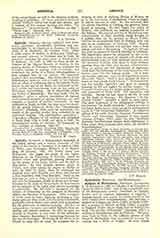

Agricola, GEORGE (BAUER, latinized into AGRICOLA), physician, mineralogist, historian, and controversialist, b. at Glauchau, in Saxony, March 24, 1494; d. at Chemnitz, October 23, 1555. After a wide course of studies in philosophy, philology, and natural sciences, in Germany and in Italy, he practiced medicine for some years at Joachimsthal in Bohemia. In 1530, or 1531, he went, at the invitation of the Elector Maurice of Saxony, to the mining district of Chemnitz, where he continued his favorite studies in geology and mineralogy, and undertook the duties of a Saxon historiographer, a post assigned him by his patron. He approved Luther’s first proceedings. The moral effects of the Reformation, however, and a study of the Fathers, had the effect of confirming him in his Catholic Faith, which, to the day of his death, he continued to defend boldly and strenuously, even in the midst of Protestant surroundings. He is deservedly styled the Father of Mineralogy. His chief work, “De Re Metallica”, gives a minute description of various contemporary methods of mining, smelting, etc., and contains a number of curious woodcuts. It was published at Basle, in 1556, the year after his death. Of his purely historical works, the “Dominatores Saxonici” (Freiberg, 1538) may be mentioned; the results of his patristic studies were embodied in an unprinted treatise, “De traditionibus apostolicis”. A complete collection of his writings was published at Basle, from 1550 to 1558, and again in 1657; his mineralogical works, in German, by Lehmann, in four volumes, at Freiberg, 1806-13.
FRANCIS W. GREY

